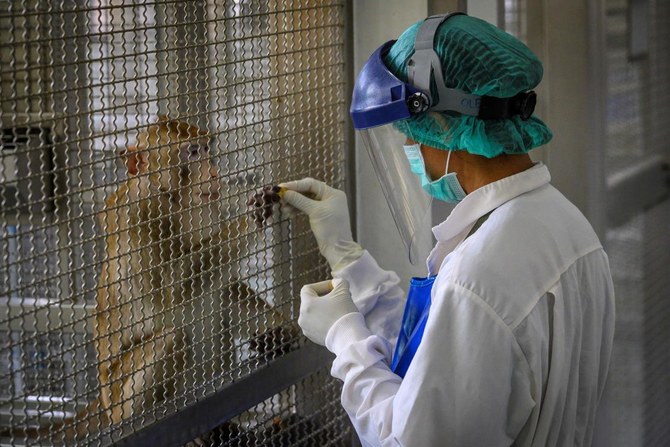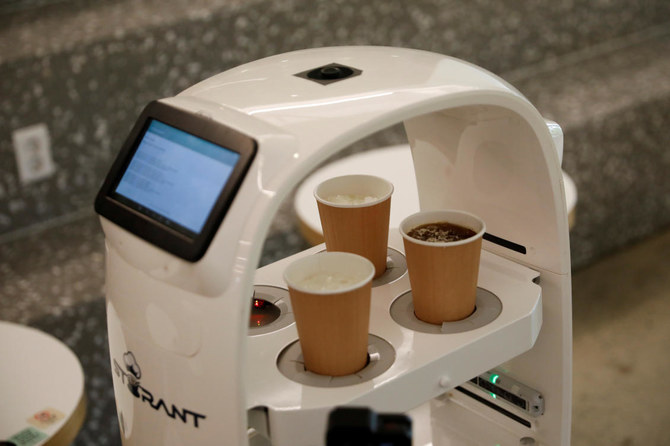DUBAI: Countries in the Middle East have issued strict rules during the Eid Al-Fitr holiday with an aim to prevent further spread of coronavirus.
Saudi Arabia celebrated the first day of Eid al-Fitr in a state of 24-hour lockdown, imposed last week to slow the spread of COVID-19.
Earlier King Salman thanked people in Saudi Arabia for abiding by the curfew.
In Egypt, a video of a man wearing Al-Azhar University’s uniform being chased by police was posted by social media users on Sunday. The incident happened after the country cancelled Eid prayers in mosque grounds.
May 25, 2020, Monday (All times in GMT)
19:30 - Britain will reopen thousands of high street shops, department stores and shopping centers next month, Prime Minister Boris Johnson said on Monday, setting out a timetable for businesses as part of moves to ease the coronavirus lockdown. READ THE FULL STORY HERE.

18:28 - Kuwait will not extend its 24-hour curfew beyond May 30, the interior minister said, adding that the cabinet will announce on Thursday the details of a partial curfew and a plan for public life to return to normal gradually.
Kuwait had imposed a full-time curfew from May 10 to May 30 to help to curb the spread of coronavirus.
18:11 - Saudi Arabia's health minister Tawfiq Al-Rabiah said "the early measures taken by the Kingdom helped us take control of the pandemic," adding that the lockdown will ease in phases starting from Thursday, and will be extended depending on reported cases.
17:06 - Dubai will allow free movement and business activity to restart during the day from Wednesday, Crown Prince Sheikh Hamdan bin Mohammed said.
Restrictions will remain in place however from between 11.00 p.m. and 6.00 a.m., the Dubai Media Office said in a press release.
18:14 - Prime Minister Boris Johnson said that Britain could reopen all non-essential retail stores on June 15 if the coronavirus remains contained.
“On June 15, we intend to allow all non-essential retail, ranging from department stores to small independent shops, to reopen,” Johnson told reporters, stressing that this “will be contingent upon progress against” the disease.
16:02 - Deaths from the COVID-19 epidemic in Italy climbed by 92, against 50 the day before, the Civil Protection Agency said, while the daily tally of new cases dropped to just 300 from 531 on Sunday.
The number of confirmed cases amounts to 230,158, the sixth highest global tally behind those of the US, Russia, Spain, Britain and Brazil.
15:48 - UK Prime Minister Boris Johnson's special adviser Dominic Cummings said he feels that the rules allowed him to exercise his judgment.
12:50 - Saudi Arabia reported nine new deaths from coronavirus, bringing the total to 399, the health ministry said.
It also reported 2,235 new cases and 2,148 cases have recovered, bringing the total to 45,668.
12:15 - War-torn Syria has reported 20 new cases of coronavirus, the largest single-day increase to date in the country, the health ministry said.
12:01 - Lebanon has reported five new coronavirus cases, raising total to 1,119.
11:59 - German government said it aims to extend social distancing rules to July 5 according to a policy draft
11:32 - Qatar has recorded 1,751 new coronavirus infected cases.
11:30 - Ethiopia has registered 73 new coronavirus cases, bringing total to 601.
10:22 - Morocco has reported 62 new coronavirus cases, raising total to 7,495.
10:06 - Iran has confirmed 34 new coronavirus deaths, raising total number of fatalities to 7,451. It also registered 2023 new cases, bringing the total to 137,724.
10:05 - Kuwait has recorded 665 new coronavirus cases.
09:46 - A total of 172 people have tested positive for coronavirus in Malaysia, raising the total number of infected patients to 7,417.
09:15 - Japan’s Prime Minister Shinzo Abe has lifted coronavirus state of emergency.
09:05 - Scientists in Thailand have joined the race to find a vaccine for coronavirus, after a successful first phase they are now testing their hoped cure on monkeys.

08:15 - A cafe in South Korea has taken social distancing to a whole new level witn the introduction of a robot barista.

05:38 - Legendary Egyptian actress Ragaa El-Gedawy has tested positive for coronavirus, ET Bilarabi reported.
04:48 - Thailand has recorded two new coronavirus cases and one death.
04:47 - Germany has reported 178,570 confirmed coronavirus cases and 8,257 deaths according to Robert Koch Institute.
May 24, 2020, Sunday
23:00 - Yemen’s Marib has imposed an 11-hour coronavirus curfew from 6 p.m. to 5 a.m. starting Sunday until further notice.
18:07 - Jordan launched a website to help in the implementation of the country’s third phase of repatriation for citizens wanting to return to the Kingdom, state news agency Petra reported citing the Director of the Coronavirus Crisis Cell Brig. Gen. Mazen Al-Faraya.
13:16 - The UAE recorded 781 new coronavirus cases overnight after conducting an additional 35,000 tests, bringing the country’s total number of known infections to 29,485, the health ministry said.





























